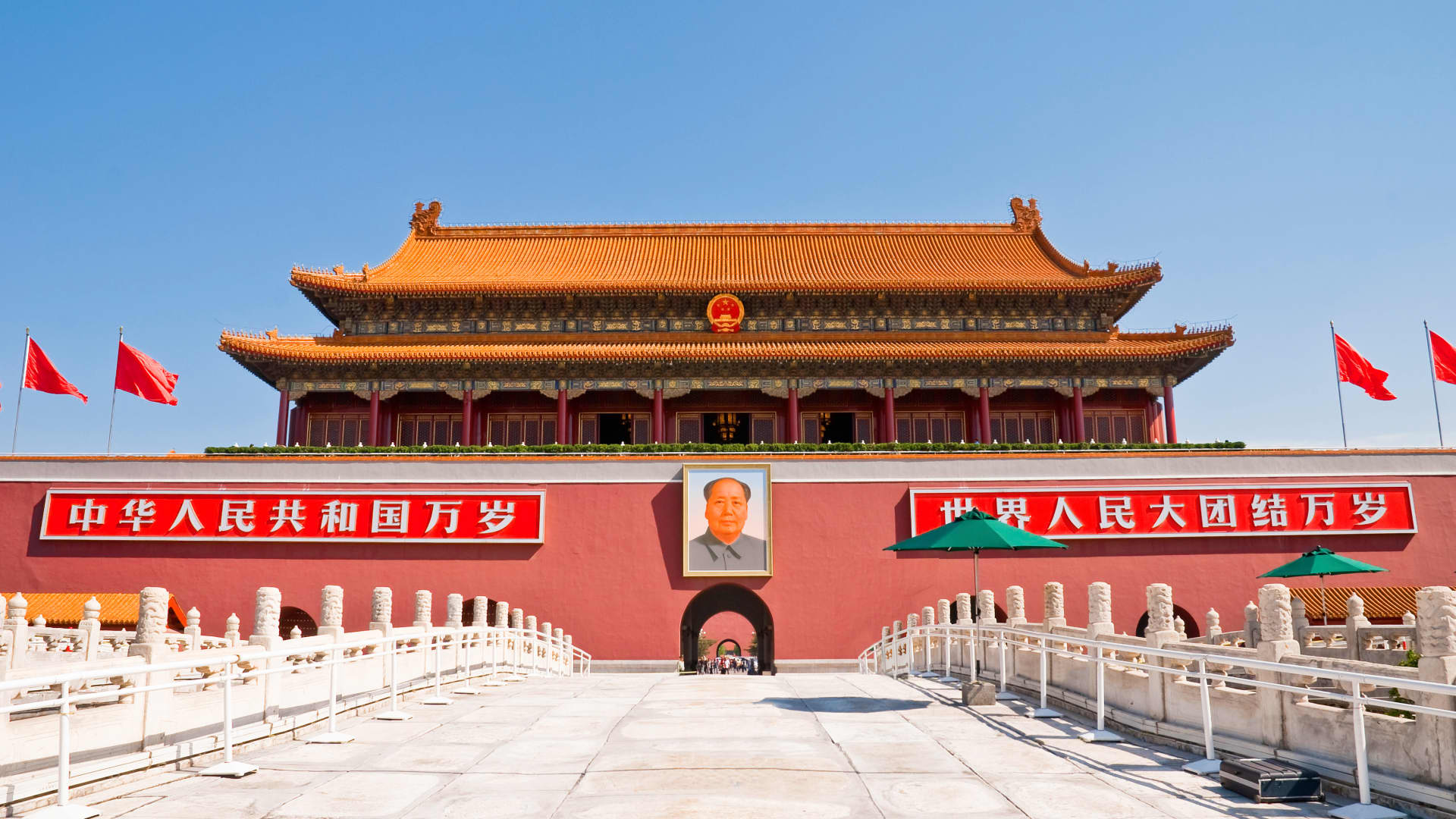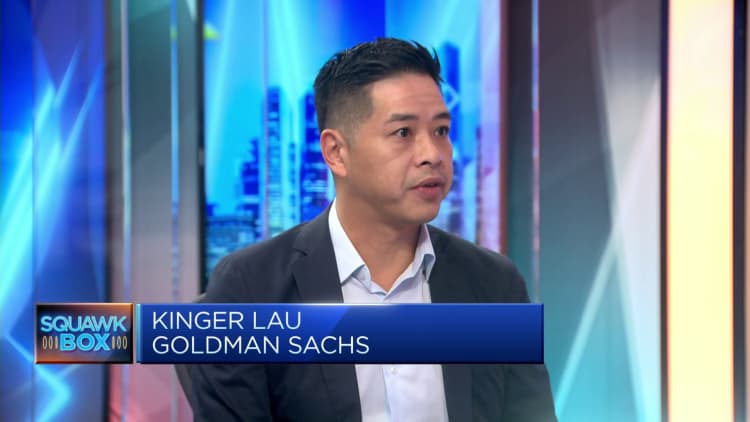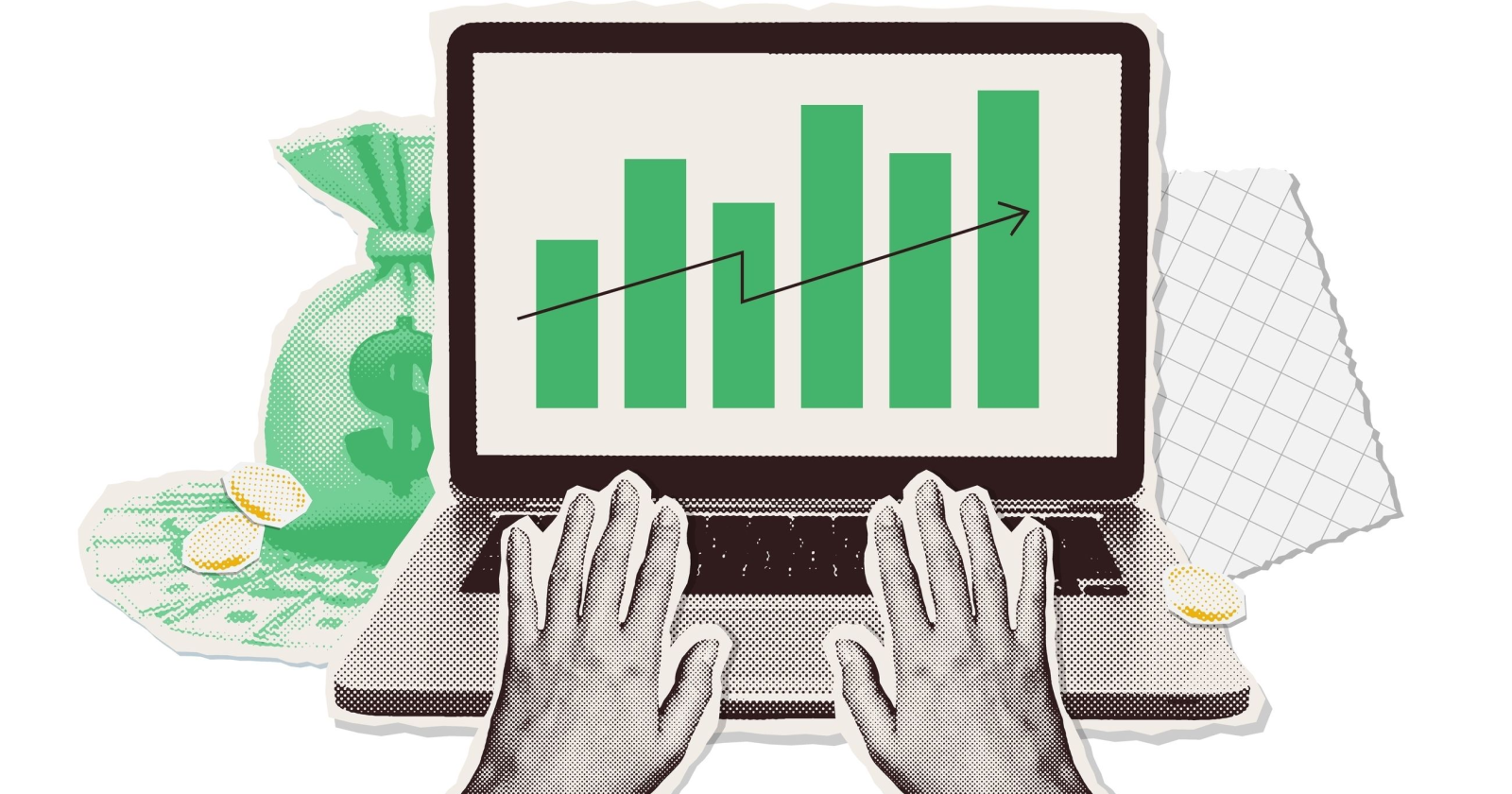Goldman Sachs expects China stocks to make first annual gain in 4 years in 2024
Chinese stocks may have their first yearly gain in four years in 2024, helped by more accommodative policy that should cushion the drag from the property deleveraging.

Tiananmen, Gate of Heavenly Peace, Beijing
Bjdlzx | E+ | Getty Images
Goldman Sachs picked sectors in China's mass consumer market and technology, media and telecom as likely winners in the ongoing rebalancing in the world's second-largest economy in the year ahead as the policy environment turns more accommodative.
"Our view is very clear," Kinger Lau, Goldman Sachs chief China equity strategist, told CNBC's "Squawk Box Asia" on Tuesday.
"We think the policy put has been exercised across the key policy cohorts, when it comes to monetary easing, fiscal policy stimulus, property market relaxation and quite importantly, the deregulation, in the industry tightening of the last few years," he said.
A policy put refers more generally to betting on policy easing if the economy weakens.
In this case, the Chinese central government has signaled it's switched to a more supportive policy posture — even if it's refrained from aggressive support — after tranches of economic data earlier this year suggest the growth momentum in the Chinese economy was sputtering.
Investors are looking to the Third Plenum of the 20th Central Committee of the Chinese Communist Party — a meeting that's likely to happen before the end of this year — for more policy cues.
China rebalancing
With just under six weeks of the year remaining, the MSCI China and CSI 300 indexes are both poised for third-straight annual losses. Goldman Sachs noted both mutual and hedge fund mandates globally are running with multi-year low allocations in Chinese stocks.
Goldman Sachs argued that Chinese equities may be set for the first index gains in four years in 2024, expecting MSCI China and CSI 300 to rise 12% and 15%, respectively, underpinned by an estimated earnings growth of about 10% and "moderate" valuation gains.
"Consensus earnings estimates look optimistic for 2024 and 2025 but an arguably bearish policy and/or geopolitical outlook is embedded in the suppressed valuations, pointing to a right-skewed return distribution if these concerns subside," Goldman Sachs strategists headed by Lau, wrote in their 2024 outlook report released last week.
The strategists said, however, there are opportunities in China's rebalancing toward sectors such as artificial intelligence and "new" infrastructure that offers greater enhancements economically, socially and environmentally.
They are also positive on sectors that are important to China's national development objectives, such as batteries, new energy vehicles and renewable energy.
Key changes
In their latest outlook paper, Goldman Sachs strategists upgraded the food and beverage sector to overweight from market weight and technology hardware sector to overweight from underweight.
They believe tech hardware, which has seen close to a 40% cut in earnings in the last two years, could reverse the downtrend in 2024 on global restocking and specific product cycles.

They also downgraded Chinese consumer services and insurance sectors from overweight to market weight, while also downgrading Chinese banks from market weight to underweight for its exposure to the Chinese property crisis.
"Property-centric cohorts, notably banks, could see further downward revision risk to consensus earnings on continued (net interest margins) and (non-performing loans) pressures," they said.
Real estate has been a key driver of the downturn in the Chinese economy after Beijing started cracking down on the debt levels of mainland developers in 2020.
Years of exuberant growth led to the construction of ghost towns where supply outstripped demand as developers looked to capitalize on the desire for home ownership and property investment.
Read more about China from CNBC Pro
"We think that the Chinese housing deleveraging process will take a few years to manifest and to play out," Goldman Sachs' chief China equity strategist Lau told CNBC on Tuesday. "So over the next few years, we think that the housing market will continue to be a drag to economic growth, which is why we need all these policy support to stabilize growth."
Goldman Sachs is also more sanguine on the onshore Chinese stock markets, retaining their overweight rating for onshore markets, but lowering the H-share market to market weight from overweight.
"We believe the strategic investment case still looks more compelling for China [A-shares] owing to its lower sensitivity to geopolitical and liquidity factors, more elevated [equity risk premium], and its better sector alignment with policy tailwinds and China's growth objectives," Goldman Sachs strategists said in their outlook report.
— CNBC's Shreyashi Sanyal contributed to this story.

 Hollif
Hollif 





























![Are You Still Optimizing for Rankings? AI Search May Not Care. [Webinar] via @sejournal, @hethr_campbell](https://www.searchenginejournal.com/wp-content/uploads/2025/06/1-1-307.png)

